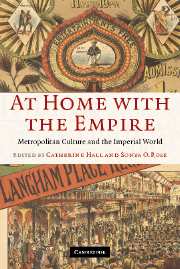Book contents
- Frontmatter
- Contents
- Notes on contributors
- 1 Introduction: being at home with the Empire
- 2 At home with history Macaulay and the History of England
- 3 A homogeneous society? Britain's internal ‘others’, 1800–present
- 4 At home with the Empire: the example of Ireland
- 5 The condition of women, women's writing and the Empire in nineteenth-century Britain
- 6 Sexuality and empire
- 7 Religion and empire at home
- 8 Metropolitan desires and colonial connections: reflections on consumption and empire
- 9 Imagining empire: history, fantasy and literature
- 10 New narratives of imperial politics in the nineteenth century
- 11 Bringing the Empire home: women activists in imperial Britain, 1790s–1930s
- 12 Taking class notes on empire
- 13 Citizenship and empire, 1867–1928
- Select bibliography
- Index
13 - Citizenship and empire, 1867–1928
Published online by Cambridge University Press: 11 April 2011
- Frontmatter
- Contents
- Notes on contributors
- 1 Introduction: being at home with the Empire
- 2 At home with history Macaulay and the History of England
- 3 A homogeneous society? Britain's internal ‘others’, 1800–present
- 4 At home with the Empire: the example of Ireland
- 5 The condition of women, women's writing and the Empire in nineteenth-century Britain
- 6 Sexuality and empire
- 7 Religion and empire at home
- 8 Metropolitan desires and colonial connections: reflections on consumption and empire
- 9 Imagining empire: history, fantasy and literature
- 10 New narratives of imperial politics in the nineteenth century
- 11 Bringing the Empire home: women activists in imperial Britain, 1790s–1930s
- 12 Taking class notes on empire
- 13 Citizenship and empire, 1867–1928
- Select bibliography
- Index
Summary
This chapter explores how Britain's status as an imperial nation shaped debates about and changes in the nature of citizenship between roughly 1867 when some working-class men were granted the parliamentary franchise and 1928 when adult suffrage was made universal. It was during this period that empire and nation became linked in new ways, marked by Britain taking a ‘more consciously imperialist course’, especially prior to World War I, and its empire becoming an increasingly visible symbol of national worth. The chapter will explore how Britain's status as an imperial nation informed debates about political citizenship, influenced responses to the broadening of the franchise and, in turn, produced new understandings of and concerns with the nature of citizenship. While both the meanings of citizenship and considerations of Britain's imperial project were contested throughout the period, the chapter focuses primarily on those hegemonic understandings and their various articulations that dominated public culture, both shaping political debate and infusing everyday life.
Between 1866 and 1928 the size of the electorate in Britain multiplied by about twenty times, from about 1.4 million in 1866 to 28.5 million by 1929. Thus it was during this period that British liberal democratic citizenship was consolidated. But this process of consolidation or development was a highly contested one; throughout, those who had a political stake in the nation guarded their prerogative jealously and it was as a consequence of debate and struggle over the terms of political fitness that new classes of individuals were enfranchised.
- Type
- Chapter
- Information
- At Home with the EmpireMetropolitan Culture and the Imperial World, pp. 275 - 297Publisher: Cambridge University PressPrint publication year: 2006
- 23
- Cited by



